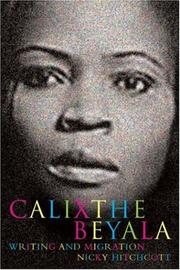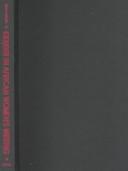| Listing 1 - 9 of 9 |
Sort by
|
Book
ISBN: 9782296075603 2296075606 Year: 2009 Volume: *141 Publisher: Paris Harmattan
Abstract | Keywords | Export | Availability | Bookmark
 Loading...
Loading...Choose an application
- Reference Manager
- EndNote
- RefWorks (Direct export to RefWorks)
Book
Year: 1994 Publisher: Ann Arbor, Mich. Pennsylvania State University
Abstract | Keywords | Export | Availability | Bookmark
 Loading...
Loading...Choose an application
- Reference Manager
- EndNote
- RefWorks (Direct export to RefWorks)
Thematology --- Sociology of literature --- Morrison, Toni --- Schwarz-Bart, Simone --- Beyala, Calixthe --- French Antilles
Dissertation
Year: 1997 Publisher: Liège : Université de Liège [ULg], Faculté de Philosophie et Lettres,
Abstract | Keywords | Export | Availability | Bookmark
 Loading...
Loading...Choose an application
- Reference Manager
- EndNote
- RefWorks (Direct export to RefWorks)
roman africain --- beyala (calixthe) --- femmes dans la litterature --- personnages feminins --- critique et interpretation --- afrique
Book
ISBN: 1282713213 9786612713217 0739145134 9780739145135 9780739145111 0739145118 9781282713215 6612713216 Year: 2010 Publisher: Lanham, [Md.] : Lexington Books,
Abstract | Keywords | Export | Availability | Bookmark
 Loading...
Loading...Choose an application
- Reference Manager
- EndNote
- RefWorks (Direct export to RefWorks)
Gender, Migration, and the Claims of Postcolonial Nationhood in Francophone Africa examines three major migrant women writers from Francophone Africa: Ken Bugul, Calixthe Beyala, and Fatou Diome. Coly studies what home means in the context of migration and how gender shapes the meaning of home. This is the first study to bring together migrant women from Francophone Africa. This is also the first study to offer a feminist critique of postnationalist discourses of home, specifically the application of postnationalism to the postcolonial context.
African literature (French) --- Sex role in literature. --- Immigrants in literature. --- History and criticism. --- Bugul, Ken --- Beyala, Calixthe --- Diome, Fatou, --- M'Baye, Mariétou --- Criticism and interpretation.

ISBN: 1781386277 1846312728 9781846312724 9781846310287 1846310288 9781781386279 Year: 2006 Publisher: Liverpool Liverpool University Press
Abstract | Keywords | Export | Availability | Bookmark
 Loading...
Loading...Choose an application
- Reference Manager
- EndNote
- RefWorks (Direct export to RefWorks)
The most successful female writer from Francophone Africa, Calixthe Beyala occupies an unusual place in French literary and popular culture. Her novels are bestsellers and she appears regularly on French television, yet a conviction for plagiarism has tarnished her reputation. Thus, she is both an "authentic" African author and a proven literary "fake."In Calixthe Beyala, Nicki Hitchcott considers representations of Beyala in the media, critical responses to her writing, and Beyala's efforts to position herself as a champion of women's rights. Hitchcott pays equal attention to Beyala's novels, tracing their explorations of the role of migration in the creation of personal identity.
Authors, African. --- African authors --- African literature --- Beyala, Calixthe --- Criticism and interpretation. --- Fiction --- Thematology --- Sociology of literature --- France --- Cameroon --- Emigration and immigration in literature. --- Identity (Psychology) in literature. --- Literature --- Literary criticism --- Writers --- Book
Book
ISBN: 9780779980062 0779980069 9780773429215 Year: 2015 Publisher: Lewiston
Abstract | Keywords | Export | Availability | Bookmark
 Loading...
Loading...Choose an application
- Reference Manager
- EndNote
- RefWorks (Direct export to RefWorks)
This is the most important book on how female African novelists depict masculine archetypes, and how male characters are shaped through the gaze of a female author. Masculinity has been a buzzword of recent African gender scholarship, although very little work has been done in this area. Emerging studies have discussed how men are depicted in African culture, but this will be the first book length study of masculinity in Sub-Saharan African Literature by female authors. Less attention has been given to masculinity in literature, and this is the first book to discuss how female authors depict, and perhaps romanticize masculine archetypes they wish men would embody. Within the confines of traditional African culture, it is difficult for men to show compassionate or emotional sides of their character. These qualities are viewed as feminine, and thereby a sign of weakness. Yet these women writers all call into question the predominant stereotypes and behaviors associated with macho-masculinity. The emphasis in this study lies in how men are shaped in relation to their female counterparts, and viewed through the gaze of a female author.--
African literature (French) --- African literature --- Masculinity in literature. --- Man-woman relationships in literature. --- Men in literature. --- Women authors --- History and criticism. --- Bâ, Mariama --- Bassek, Philomène M., --- Zanga Tsogo, Delphine, --- Beyala, Calixthe --- Fall, Aminata Sow --- Criticism and interpretation. --- Masculinity (Psychology) in literature --- Black literature (African) --- Authors, African --- French literature --- African authors --- Sow Fall, Aminata --- Tsogo, Delphine Zanga, --- Tsanga, Delphine, --- Bâ, Mariyaama
Book
ISBN: 9780813931876 9780813931869 9780813932002 0813932009 081393186X 0813931878 1280490489 9781280490484 9786613585714 6613585718 Year: 2011 Publisher: Charlottesville London : University of Virginia Press,
Abstract | Keywords | Export | Availability | Bookmark
 Loading...
Loading...Choose an application
- Reference Manager
- EndNote
- RefWorks (Direct export to RefWorks)
In her focus on irony and meaning in postcolonial African fiction, Gloria Nne Onyeoziri refers to an internal subversion of the discourse of the wise and the powerful, a practice that has played multiple roles in the circulation of knowledge, authority, and opinion within African communities; in the interpretation of colonial and postcolonial experience; and in the ongoing resistance to tyrannies in African societies. But irony is always reversible and may be used to question the oppressed as well as the oppressor, shaking all presumptions of wisdom. Although the author cites numerous African writers, she selects six works by Chinua Achebe, Ahmadou Kourouma, and Calixthe Beyala for her primary analysis.
African literature (French) --- African literature (English) --- Irony in literature. --- Meaning (Philosophy) in literature. --- Postcolonialism in literature. --- Littérature africaine (française) --- Littérature africaine (anglaise) --- Ironie dans la littérature --- Signification (Philosophie) dans la littérature --- Postcolonialisme dans la littérature --- History and criticism. --- Histoire et critique --- Kourouma, Ahmadou --- Achebe, Chinua --- Beyala, Calixthe --- Criticism and interpretation. --- Littérature africaine (française) --- Littérature africaine (anglaise) --- Ironie dans la littérature --- Signification (Philosophie) dans la littérature --- Postcolonialisme dans la littérature --- English literature --- French literature --- African authors --- Achebe, Albert Chinua --- Achebe, Chinualumogu Albert --- Ats'ebeh, Ts'inuʼa --- Acībī, Cinūā --- Achebe, Albert Chinualumogu --- אצ׳בה, צ׳ינוא --- أتشينى، شينوا --- Ahmadou Kourouma --- Kourouma, Ahmadou (1927-2003) --- Achebe, Chinua (1930-....) --- Beyala, Calixthe (1961-....) --- Littérature africaine de langue anglaise --- Littérature africaine de langue française --- Ironie --- Sens (philosophie) --- Postcolonialisme --- Critique et interprétation --- 20e siècle --- Dans la littérature
Book
ISBN: 9028926666 9789028926660 Year: 1999 Publisher: Kapellen Uitgeverij Pelckmans
Abstract | Keywords | Export | Availability | Bookmark
 Loading...
Loading...Choose an application
- Reference Manager
- EndNote
- RefWorks (Direct export to RefWorks)
World history
---
Literature: authors
---
Letterkunde
---
Littérature
---
Literature, Modern
---
History and criticism
---
Developing countries
---
Literatures
---
#BIBC:ruil

ISBN: 0585099731 9780585099736 025333344X 0253211492 9780253333445 9780253211491 Year: 1997 Publisher: Bloomington Indiana University Press
Abstract | Keywords | Export | Availability | Bookmark
 Loading...
Loading...Choose an application
- Reference Manager
- EndNote
- RefWorks (Direct export to RefWorks)
"This is a cogent analysis of the complexities of gender in the work of nine contemporary Anglophone and Francophone novelists. . . . offers illuminating interpretations of worthy writers . . . " --Multicultural Review"This book reaffirms Bessie Head's remark that books are a tool, in this case a tool that allows readers to understand better the rich lives and the condition of African women. Excellent notes and a rich bibliography." --Choice". . . a college-level analysis which will appeal to any interested in African studies and literature." --The BookwatchThis book applies gender as a category of analysis to the works of nine sub-Saharan women writers: Aidoo, Bá, Beyala, Dangarembga, Emecheta, Head, Liking, Tlali, and Zanga Tsogo. The author appropriates western feminist theories of gender in an African literary context, and in the process, she finds and names critical theory that is African, indigenous, self-determining, which she then melds with western feminist theory and comes out with an over-arching theory that enriches western, post-colonial and African critical perspectives.
Developmental psychology --- Sociology of the family. Sociology of sexuality --- Sexology --- Fiction --- Thematology --- Liking, Werewere --- Beyala, Calixthe --- Dangarembga, Tsitsi --- Bâ, Mariama --- Zanga Tsogo, Delphine --- Aidoo, Ama Ata --- Head, Bessie --- Tlali, Miriam --- Cameroon --- Africa --- Emecheta, Buchi --- African Literature --- Women And Literature --- Women In Literature --- Gender Identity In Literature --- Literary Criticism --- Gender --- Identity --- Literature --- Sexuality --- Writers --- Theory --- Images of women --- Book --- African literature --- Women and literature --- Women in literature --- Gender identity in literature --- Literary criticism --- Women in literature. --- History and criticism --- Women authors --- History and criticism. --- History
| Listing 1 - 9 of 9 |
Sort by
|

 Search
Search Feedback
Feedback About UniCat
About UniCat  Help
Help News
News